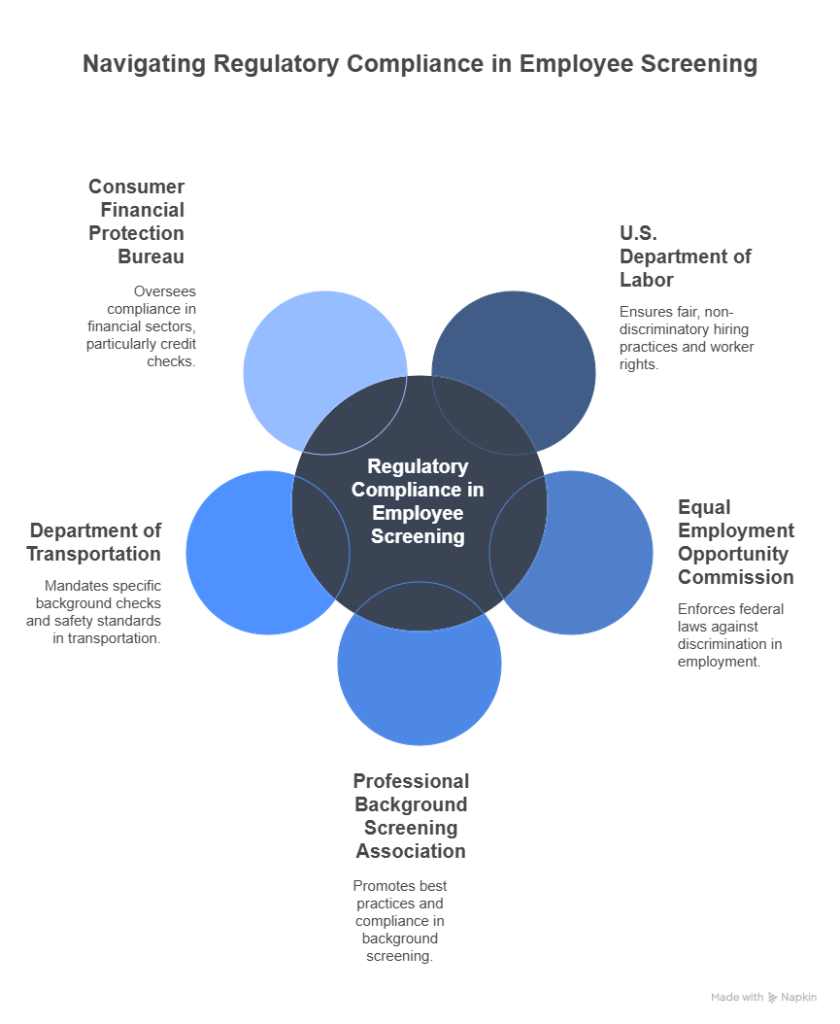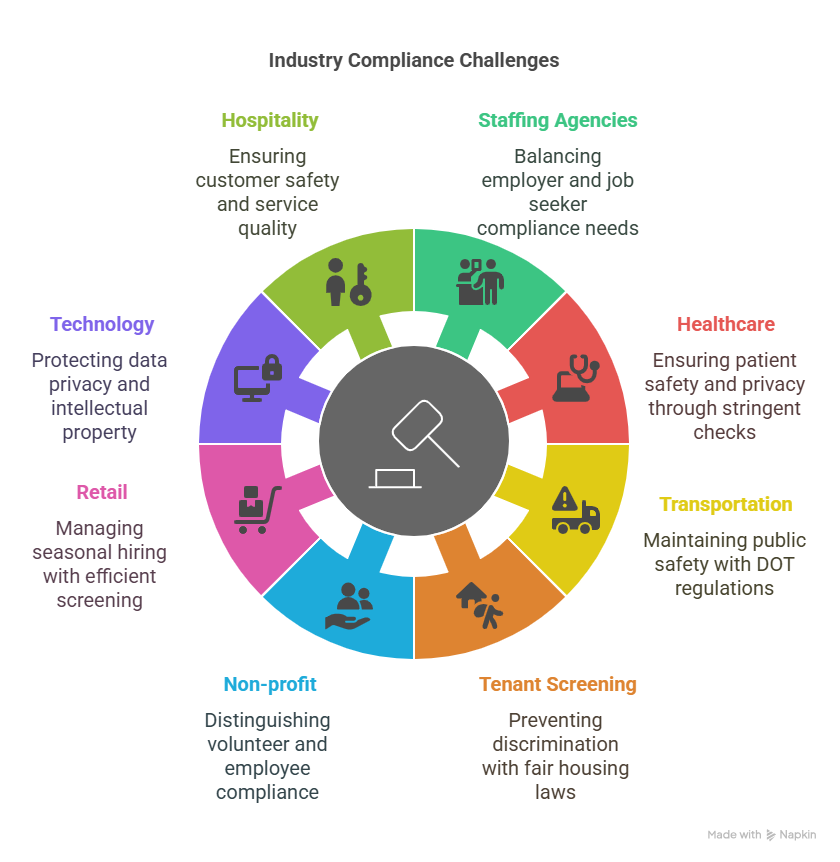Navigating the complex landscape of legal compliance in employee screening can be challenging. For business owners, HR professionals, recruiters, and job seekers across various industries, ensuring that all screening processes adhere to legal standards is crucial. This guide will cover the essential aspects of legal compliance in screening, offering practical advice and insights tailored to your needs.
Key Takeaways
- Legal compliance in employee screening involves adhering to federal, state, and local regulations, ensuring a fair and lawful hiring process.
- Understanding the guidelines of key regulatory bodies like the U.S. Department of Labor and the Equal Employment Opportunity Commission is crucial for avoiding legal pitfalls.
- Essential compliance components include lawful background checks, informed consent for tests, maintaining data privacy, and adhering to specific industry standards.
- Specific industries such as healthcare, transportation, and technology have unique compliance challenges and requirements that must be meticulously followed.
- Continuous learning, regular training, leveraging technology, and standardizing processes are essential for maintaining robust and effective compliance in employee screening.
Introduction
Ah, the maze of legal compliance in employee screening—it's as intricate as it is necessary. Whether you're an HR professional, a business owner, or even a job seeker, nailing this aspect can save everyone a world of trouble.
So, what exactly are we talking about when we say "legal compliance in screening"? Think of it as a rulebook that guides how to vet potential employees without crossing any legal lines. From background checks to credit reports, every step must adhere to specific laws to protect both employer and employee.
In this guide, we're diving into the nitty-gritty of legal standards, compliance requirements, and the maze of regulations that vary across industries. Buckle up, it's going to be a practical journey that will arm you with the knowledge to stay on the right side of the law.

Understanding Legal Compliance in Screening
Legal compliance in screening is about ensuring that all the steps taken during the hiring process meet federal, state, and local regulations. This can include everything from conducting background checks to drug testing and ensuring data privacy. Essentially, it means making sure that your screening practices are fair, transparent, and lawful.
Why is this important? For employers, staying compliant means avoiding hefty fines, lawsuits, and damage to your reputation. For employees, it assures that the screening procedures respect their rights and privacy, creating a more trustworthy and equitable hiring process.
Different industries face unique compliance challenges:
- Staffing Agencies need to quickly and efficiently screen candidates while ensuring they meet a broad range of regulatory requirements for various clients.
- Healthcare must adhere to strict guidelines due to the sensitive nature of patient data and the critical need for trustworthy personnel.
- Transportation sectors, guided by DOT regulations, require rigorous background and drug testing to maintain safety standards.
- Tenant Screening is heavily influenced by the Fair Housing Act, necessitating non-discriminatory practices.
- Non-profit organizations often navigate a mix of volunteer and paid staff compliance requirements, sometimes influenced by grant stipulations.
- Retail, especially with its seasonal hiring spikes, must balance speed and legal thoroughness in their screening.
- Technology companies need to be vigilant about data privacy and cybersecurity compliance in their hiring processes.
- Hospitality sectors prioritize customer safety and managing a seasonal workforce, making compliance an ongoing concern.
Understanding these nuances not only helps in adhering to legal standards but also builds a more robust and fair screening system for all parties involved.
EXPERT INSIGHT: One of the most challenging but most rewarding HR specialties is charting through the legal compliance minefield in employee screening. Having seen over the years just how crucial it is to get it right—not to avoid legal pitfalls, but to instill trust and fairness in the recruitment process—compliance is an area that I thoroughly enjoy. Compliance is not simply doing as told; it is being respectful to the dignity and rights of all candidates while keeping organisations ethically grounded. As an HR practitioner, it's one that I personally take to heart, wanting to learn, develop, and make the recruitment process open, fair, and legally compliant. Each choice we make in the screening process can have an impact on workplace culture, and one that I firmly believe that with proper knowledge and tools we can convert this challenge to an opportunity to foster diversity and integrity in the workplace. - Charm Paz, CHRP
Key Regulatory Bodies and Legal Standards
Navigating the legal maze of employee screening involves an understanding of key regulatory bodies and their standards. Let’s break this down:
U.S. Department of Labor (DOL)
The U.S. Department of Labor sets the tone with regulations ensuring that hiring practices are fair, non-discriminatory, and transparent. These guidelines cover various aspects, such as wage standards, working conditions, and worker rights. Compliance with DOL standards means regular updates on their hiring rules and policies, as failure to do so can lead to significant penalties.
Equal Employment Opportunity Commission (EEOC)
The EEOC plays a crucial role in enforcing federal laws that make it illegal to discriminate against job applicants and employees. This is particularly significant in the context of background checks. The EEOC’s guidance on background checks ensures that these are conducted fairly, without inadvertently discriminating based on race, color, national origin, sex, or religion. Employers are advised to remain vigilant about adhering to these guidelines to avoid litigation and ensure a fair hiring process.
Professional Background Screening Association (PBSA)
The PBSA champions best practices in the background screening industry. This organization provides a benchmark for quality and accuracy in screening services, promoting compliance with legal standards through rigorous certification programs. Members of the PBSA are encouraged to follow industry-leading practices, thus ensuring compliance and enhancing trustworthiness in the eyes of both regulators and job seekers.
Other Relevant Bodies
Depending on the industry, other significant regulatory bodies may include:
- Department of Transportation (DOT): For industries such as transportation, the DOT mandates specific background checks and safety standards.
- Consumer Financial Protection Bureau (CFPB): Overseeing compliance in financial sectors, particularly around credit checks.
- Office of Federal Contract Compliance Programs (OFCCP): Ensuring that employers doing business with the federal government comply with laws and regulations requiring nondiscrimination.
Keeping abreast of the guidelines and updates from these bodies is essential. Avoid these regulatory pitfalls by integrating their standards into your screening processes, thus ensuring robust compliance and gaining trust from potential employees.

Essential Components of Legal Compliance
Background Checks
Ensuring that your background checks adhere to legal standards is non-negotiable. These checks typically include verifying criminal history, employment history, education, and sometimes social media activity. Legally, informed consent is crucial—candidates must be made aware that a background check will be conducted and must explicitly agree to it. Additionally, if an adverse decision is made based on the findings, the candidate has the right to know the reasons and dispute the findings if necessary.
Drug Testing
Drug testing requirements vary considerably across regions and industries. Federally mandated in sectors like transportation and defense, drug testing aims to ensure safety and compliance. For private industries, it's less structured but still requires clear policy communication to employees. Ensure your drug testing protocols align with federal, state, and local laws, and always seek employee consent.
Medical Examinations
Medical examinations are often required for roles demanding specific physical capabilities. The Americans with Disabilities Act (ADA) stipulates that these exams be job-related and only conducted post-offer to avoid discrimination. Confidentiality is key—medical information must be stored separately from other employee records and only shared on a need-to-know basis.
Credit Checks
Running credit checks is more sensitive and often restricted to roles involving financial responsibilities. The Fair Credit Reporting Act (FCRA) dictates strict guidelines: you need explicit consent and must provide candidates with a copy of the report and a summary of their rights. Some states have additional restrictions, so always verify local regulations before proceeding.
Reference Checks
Reference checks are both an art and a science. Legally, always obtain the candidate's permission before contacting their references. Avoid asking questions that could be seen as discriminatory (e.g., concerning age, race, religion). Stick to job-related queries focusing on the applicant’s skills, reliability, and performance. Document all interactions to maintain a clear compliance trail.
By focusing on these components, companies not only adhere to legal requirements but also establish processes that foster trust and fairness in their hiring practices.
Compliance Requirements Across Specific Industries
Staffing Agencies
Staffing agencies face unique challenges in maintaining legal compliance during the screening process, primarily due to the volume and variety of roles they fill. Because staffing agencies operate as intermediaries between employers and job seekers, they must balance the compliance requirements that apply to both parties. Key areas of focus include accurate background checks and adherence to labor laws such as the Fair Labor Standards Act (FLSA).
Unique Challenges: Staffing agencies often deal with a high turnover rate and diverse job roles, complicating the consistency of screening practices. Additionally, they must ensure compliance with specific client requests and varying state laws governing employment practices.
Best Practices: To navigate these challenges, staffing agencies should implement standardized screening procedures and stay updated on federal and state regulations. Partnering with reputable background check providers and legal experts can help maintain compliance while mitigating risks.
Healthcare
The healthcare industry is heavily regulated, requiring stringent compliance standards to safeguard patient safety and privacy. This sector must abide by laws such as the Health Insurance Portability and Accountability Act (HIPAA), which mandates the protection of sensitive patient information during the hiring process.
Regulatory Landscape: Healthcare employers must conduct thorough background checks, including license verification, criminal history, and exclusion lists, to comply with federal and state regulations.
Case Study: A notable example involves a large hospital network that implemented a comprehensive compliance program, reducing hiring risks and ensuring regulatory adherence, which led to improved patient trust and institutional credibility.
Transportation
The Department of Transportation (DOT) sets forth strict regulations that transportation companies must comply with when screening employees. These standards are primarily focused on ensuring public safety and operational integrity.
DOT Regulations: Key compliance areas include drug and alcohol testing, medical examinations, and background checks, particularly for roles involving the operation of commercial vehicles.
Safety Standards: Beyond DOT regulations, additional safety standards must be adhered to, such as regular health screenings and continuous monitoring of driving records.
Tenant Screening
Tenant screening involves compliance with the Fair Housing Act (FHA) to prevent discriminatory practices and ensure fair treatment for all applicants. This includes conducting background and credit checks, which must be done by federal, state, and local laws.
Fair Housing Act: Tenant screening processes must avoid discrimination based on race, color, religion, sex, handicap, familial status, or national origin.
Local Laws: Landlords and property managers need to be aware of local regulations that may impose additional screening requirements or restrictions.
Non-profit
Non-profit organizations must navigate distinct compliance requirements, especially when distinguishing between volunteers and paid staff. These organizations often rely on grant funding, which may impose specific compliance conditions.
Volunteers vs. Employees: There are different legal screening requirements for volunteers versus paid employees, often influenced by the nature of their work and their level of access to sensitive information.
Grant Requirements: Compliance with grant stipulations is crucial, as failure to do so can jeopardize funding and legal status.
Retail
Retail businesses face unique compliance challenges, particularly during periods of seasonal hiring when the workforce can expand rapidly. Ensuring that temporary staff undergo appropriate screening is essential to maintain workplace safety and customer trust.
Seasonal Hiring: The influx of seasonal workers necessitates efficient and compliant screening processes to handle the high volume without compromising quality.
Customer Interaction: For roles involving direct customer interaction, it's crucial to screen for qualities like reliability and customer service orientation, while adhering to legal standards.
Technology
Technology companies must prioritize data privacy and cybersecurity compliance in their screening processes to protect sensitive information and intellectual property.
Data Privacy: Compliance with regulations like the General Data Protection Regulation (GDPR) and the California Consumer Privacy Act (CCPA) is essential to safeguard personal data during employee screening.
Intellectual Property: Ensuring that new hires understand and commit to protecting the company's intellectual property is a critical compliance aspect.
Hospitality
The hospitality industry's compliance requirements focus on ensuring customer safety and managing a fluctuating workforce. This involves thorough screening processes to maintain quality service and safety standards.
Customer Safety: Employers must screen employees thoroughly to ensure they can maintain the safety and well-being of guests and customers.
Seasonal Workforce: The need to hire seasonal workers quickly while adhering to compliance requirements poses a significant challenge. Streamlined, compliant screening processes are necessary to manage this influx efficiently.

Common Pitfalls and How to Avoid Them
Overlooking Local Laws
It's easy to get caught up in federal regulations and overlook the importance of local laws. Each state, county, or city may have specific rules dictating employee screening processes. Ignoring these can lead to costly legal battles and fines. A practical approach is to consult local legal experts who can keep you updated with the ever-changing landscape of regional regulations. This ensures you stay compliant across all jurisdictions where your company operates.
Inconsistent Screening Practices
Inconsistent screening can be a major compliance pitfall. Treating candidates differently can open you up to claims of discrimination and unfair hiring practices. The solution? Standardize your screening procedures. Develop a clear, documented process that applies equally to all candidates. Ensure everyone involved in hiring understands and follows these protocols to maintain a fair and legally compliant process.
Inadequate Documentation
Poor documentation is another common issue. Without proper records, it's hard to prove your compliance during audits or legal disputes. Keep detailed records of every screening step, from consent forms to final decisions. Use digital tools to streamline the documentation process and ensure easy access when needed. Proper documentation not only aids in compliance but also enhances the overall efficiency of your screening practices.
Improving Your Compliance Processes
Training and Education
The backbone of any compliant screening process is a well-informed team. Regular training sessions for HR professionals and recruiters are essential. These trainings should cover the latest updates in laws and regulations, industry-specific compliance requirements, and best practices for conducting thorough and legally compliant screenings.
Audit and Review
Conducting periodic audits of your screening processes ensures that your organization remains compliant and identifies areas that need improvements. Audits can reveal inconsistencies or gaps in your procedures, providing a roadmap for corrective action. Regularly reviewing and updating your policies keeps them aligned with current legal standards and industry best practices.
Leveraging Technology
Incorporating technology into your screening processes can significantly enhance compliance. Automated systems help in maintaining accuracy and consistency, reducing human error. Compliance software can track changes in regulations, send alerts for necessary updates, and generate reports that demonstrate adherence to legal standards. Integrating technology streamlines the entire screening workflow, making it more efficient and reliable.
Conclusion
Navigating the multifaceted world of legal compliance in employee screening is no small feat, but the benefits are substantial. By adhering to the legal standards outlined in this guide, businesses can mitigate risks, avoid costly penalties, and maintain a safe, trustworthy work environment.
Key takeaways include the importance of understanding and following regulations set by bodies like the U.S. Department of Labor, the Equal Employment Opportunity Commission, and industry-specific guidelines. Incorporating essential compliance components such as lawful background checks, drug testing, and data privacy measures ensures that both employers and employees are protected.
Final thoughts emphasize that staying informed and compliant is not just a legal obligation but a practical strategy for long-term success. By embedding these compliance practices into everyday operations, businesses fortify their reputation and operational integrity.
The call to action is simple but powerful: commit to continuous learning and improvement in your compliance processes. Whether you are an HR professional, recruiter, business owner, or job seeker, understanding and executing these compliance requirements will create a more efficient, lawful, and equitable workplace. Stay proactive, engage in regular training, and leverage technology to keep compliance streamlined and effective.

GCheck Editorial Team
Meet the GCheck Editorial Team, your trusted source for insightful and up-to-date information in the world of employment background checks. Committed to delivering the latest trends, best practices, and industry insights, our team is dedicated to keeping you informed.
With a passion for ensuring accuracy, compliance, and efficiency in background screening, we are your go-to experts in the field. Stay tuned for our comprehensive articles, guides, and analysis, designed to empower businesses and individuals with the knowledge they need to make informed decisions.
At GCheck, we're here to guide you through the complexities of background checks, every step of the way.






